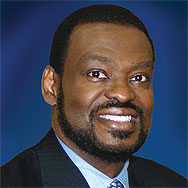
old. During that season, the “no elbows on the table” rule was in
full force. In addition, my mother constantly chided me for using
slang as opposed to proper English. Those three to four years seemed
like hell on earth. Nonetheless, years later, I could trace my
success in school to my family dinner table and a few great teachers.
My parents always said, “For a black man to do half as well, he
must be twice as good!” For them, education was almost a “sacred
privilege,” which had been denied my ancestors because of the black
and Native American social status. Today, I am shocked by the almost
unfathomable swing from my black community’s sense of excellence
and purpose to an entitlement mentality.
Not long ago, both The Washington Post and The New York
Times reported a growing national trend: Black students are
suspended and expelled from school at two to five times the rate of
white students. Both articles highlighted the unintended bias of
teachers and administrators, zero-tolerance school discipline
policies and school leadership styles as possible causes for this
development—and undoubtedly they are contributing factors.
But I wonder whether forcing teachers to sit through another
mandatory sensitivity seminar or lobbying to relax school discipline
policies will improve the long-term prospects of black students in
America?
Five years ago, Harvard’s Dr. Alvin Poussaint courageously
addressed the elephant in the living room when he brought up the role
that parents and family play in the success or failure of black
students. Poussaint discussed a shocking study by Yale’s Edward
Zigler Center in Child Development and Social Policy, which noted
that black children were expelled from pre-school at twice the
rate of white children and five times the rate of Asian children.
Clearly, if discipline issues show up in children as young as 3 or 4,
the school is not entirely to blame.
Unfortunately, when those obsessed with political-correctness are
forced to confront the importance of the family and parenting, they
brilliantly miss the forest for the trees. They overlook the obvious
problems of out-of-wedlock births and fatherless homes in search of
elusive “root causes.”
Even Poussaint, despite his brilliance, actually blamed the
practice of corporal punishment for the misbehavior of some black
children in preschool. Black parents are more likely to spank their
children than white parents. In addition, columnist Clarence Page
responded with an article entitled “Sparing the Rod May Save Black
Kids.” Like so many critics of corporal punishment, both men failed
to distinguish between physical abuse and controlled physical
chastisement.
At the end of the day, anyone with common sense knows that black
children do not act out because they are being disciplined too
strictly at home. They act out because of a lack of structure
and discipline. Others who want to skirt the central role of parents
will quickly attempt to turn the discussion of the black family to
poverty. While I agree—for the most part—that black families need
better economic opportunities to increase their wealth and relieve
the financial stress so many are facing, that issue, too, is
secondary.
Missing in the hand-wringing and ideological declarations is the
obvious question: What are black parents of successful children doing
right? America is full of black parents doing a good job,
including many single parents. Rather than looking outside of our
community for answers, we need to examine where black parents are
doing well and determine what we can do to reproduce that success in
the parts of our community that are struggling.
Patrick Fagan, a sociologist with the Marriage and Religion
Research Institute, has uncovered a key factor in successful black
parenting even under challenging circumstances: regular church
attendance. Fagan’s research shows that even when problems like
divorce and low income are factors, black children who attend
religious services regularly have more positive outcomes in nearly
every measurable area, including academic achievement.
Regular churchgoers in inner cities were much less likely to use
drugs or alcohol, commit a crime, drop out of school, become
depressed or become pregnant out of wedlock. What is even more
interesting is that the more challenging the child’s
circumstances—the lower the income, the less frequently the father
was around—the stronger the positive influence of church attendance
became.
This is not actually new information. Fagan notes that a Harvard
University study in 1985 “revealed that attendance at religious
services and activities positively affected inner-city youth school
attendance, work activity and allocation of time … youth who
frequently attended religious services were five times less likely to
skip school, compared with peers who seldom or never attended.”
Church attendance provides benefits to low-income children of
single parents that secular after-school programs and other
government-sponsored interventions do not: a loving, structured
environment that communicates a transcendent set of moral values.
Churchgoing children have access to mentors and positive peer
pressure to encourage them to make good decisions and avoid peers who
would bring a self-destructive influence.
While The Washington Post and The New York Times wring
their hands about the number of black children being suspended from
school, they continue to ignore the fact that the black children—even
those living below the poverty line in single-parent homes—who are
attending church regularly are faring much better. Maybe it’s time
to stop looking for a “fresh” solution, and time to start
directing more folks to the old solution that is actually working.
Bishop Harry R. Jackson Jr. is the senior
pastor of Hope Christian Church, a 3,000-member congregation in the
Washington, D.C., area. He is also the guest editor of the
January-February 2012 issue of Ministry Today about social
transformation.














































